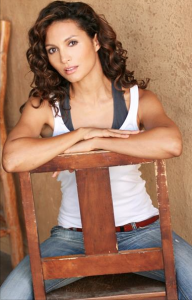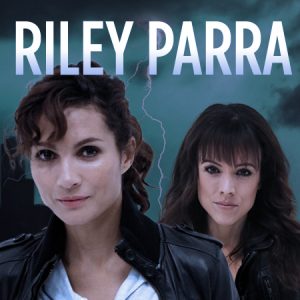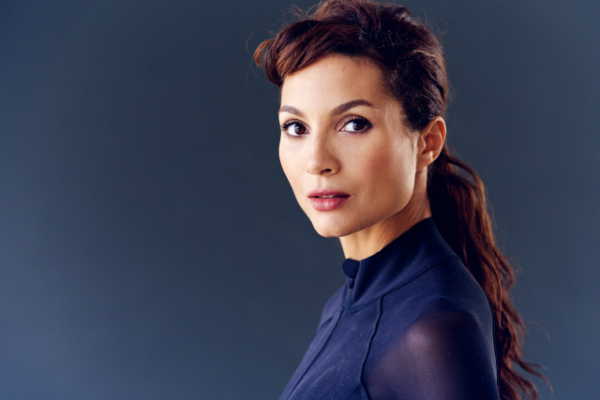Television made for and by queer women is a rare commodity. Too often, queer-identified characters are used as tokens and filled with stereotypes, denied character development or full plots, written for the straight male gaze, or subject to violence. These characters and story lines are hard to watch and do not accurately represent the communities they aim to capture. With the goal of rectifying this issue, tello Films created Riley Parra, a fantasy and action web series starring bisexual actress Marem Hassler.
The 35 year-old from Switzerland speaks five and a half languages and is one of the first women to be featured in the Madden game franchise. Her favorite animal is the cricket and she co-created a female-driven film company with her best friend from drama school. Hassler has a forever crush on Linda Hamilton from Terminator 2 and wishes for the abilities to breathe under water and eat anything without gaining weight. (Don’t we all wish for the last one!)
Between saving her city from villains as Riley and her many other projects, Hassler took a few minutes to tell us about the show, her career, and being a bisexual actor in the world today.
Tell us a little about your background.
I was born in Switzerland into an artistic family. My dad is a filmmaker, my mum was a performer and now a sculptor of erotic art. As you can probably tell, I never stood a chance!
I’ve been acting as long as I can remember even though I pursued a music career first. After several turns and record deals, it became clear that acting offered more freedom and really was the medium that allowed me to express my creativity best.
What do you love about acting?
The practice of curiosity. I think an exchange between two people can only happen when there is interaction. The challenge is to keep that interaction “pure” from perceived notions, personal patterns, and conditioned beliefs so it can serve the character and the story telling. That’s what we ideally bring to the table. An openness to see the person in front of us anew each time and discover. That’s what I’m exploring right now in my acting. It can be challenging at times and very uncomfortable. Art is about change. It’s the one thing we are so uncomfortable with, but is part of our cycle—biologically and spiritually I think. I also love being part of a creative tribe. You can’t do it by yourself, you need your fellow actors, director, and crew members. They extend and manifest that reality.
On Riley, I got to work with wonderful people: Liz Vassey; Karl E. Landler, who plays Marchosias, Riley’s nemesis, and with whom I’ve worked on several projects; Maeve Quinlan; Connor Trinneer—can’t tell you what that did to my Trekkie friends lol—and Connor Kelley-Eiding (all I can say is, watch that space!). These people are incredibly dear to me.
What is it like being an actress and bisexual in this field today?
I think times are interesting. The platforms for having a show or project seen have increased and improved. If you have a story to tell, you can tell it. And you can tell it in your distinctive and unique voice. I think the audience cries bullshit much faster and demands to be treated with respect.
Tello Films is doing exactly that—creating that platform. It’s the first lesbian network to receive an Emmy nomination. Christin Baker, founder and CEO of tello Films and our director on Riley, and our producer Kitty Swink are hands-on parts of this movement. It’s super exiting to be part of this.
What’s it like being a bisexual actress playing the love interest to a women on screen? Is this role you’ve had before?
First of all, when your love interest is Liz Vassey, you’ve kind of scored big! Not only is she beautiful, smart, and incredibly generous, she also has the kind of courage that matches and inspires. And that’s really all you can hope for. That the person in front of you will take that life vest off. That they will jump into the cold water with you and that you’ll swim or sink together—and do it all over again each time the director calls “Action!”
The difference of having a woman in front of you instead of a man, to me, has more to do with having a layer reflected back that is wrapped in a female narrative.
When it comes to love scenes, I think we are used to a male lens. The experience with Riley was so awesome because the entire Riley team was ready for that different lens. I’ve played the love interest to a woman on several occasions, most recently on a feature called Russian Doll by Ed Gaffney, which won [the] Audience Award at the qFLIX Worcester Film Festival last year.

What drew you to Riley Parra?
I fell in love with the script—just holding it in my hands! Well almost. And then writer and creator Geonn Cannon, whom I thought was a woman, sent me the books and I was hooked. He was incredibly instrumental and tireless in helping me understand Riley.
I admire her. She has a lot of fight in her, many flaws, but she is willing to stand up for her beliefs and fight to the very end. She builds on hope, not on despair, even though many things could have worked out differently for her.
LGBTQ people, people of color, and other marginalized groups are often poorly represented, absent, or written out of stories through violence. Does this show address some of these issues?
Yes, I believe so. Riley is strong and stands up for herself and her marginalized community.
I think that positive representation for minorities does have a place in the digital space, since it’s not as represented in mainstream media. So if you don’t feel aligned and represented on TV, how great to have access to other spaces.
For anyone who has not seen Riley Parra, what do you want them to take away or understand when they do?
There is a moment Riley realizes that what she’s facing is much bigger than her and she says, “I’m just a cop….” I love that line so much. We all struggle with that feeling sometimes, that what we bring to the table is not enough. Despite feeling overwhelmed, small, and inadequate, she does what needs to be done. Each day she grows into her challenge.
What advice do you have for other bisexual actresses who want to pursue their dream but are unsure if their sexuality will affect their prospects?
Be you—the you that allows you to write the story you want to tell with your life. Your sexual orientation doesn’t matter when it comes to connecting to the person in front of you. Connect to their humanness or the lack of it, not their gender. Connect to your truth.
No job, especially in the arts is easy—I don’t think it’s supposed to be! We’re tempted to look for security, manuals, and guarantees. I personally don’t think that makes for a happy life. Be formidable, be flawed, stretch into your size. Love who you want to love. Get rid of guilt, find your purpose, and fucking roar!


